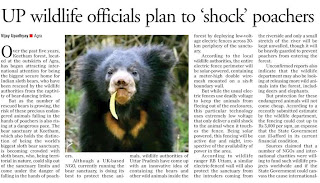Pramod Mahajan - A tribute - Some surge ahead of their dreams
CHANDAN MITRA
If you called Pramod Mahajan's mobile, the tune that greeted you was a rather unusual one:
Zindagi kaisi hai paheli, haye
Kabhi yeh hansaye, kabhi yeh rulaye
Kabhi yeh hansaye, kabhi yeh rulaye
A soulful number, but not one you would expect to hear on a cellphone. It probably underlined Pramod's supreme belief in destiny. Understandably, for it was destiny that catapulted the eldest son of a Government school teacher from Usmanabad in the innards of rural Maharashtra to the pinnacle of popularity and fame.
As his trusted personal aide, a deeply anxious Bibek Moitra told me when I visited the Hinduja Hospital last Friday, it was only his fatal injury that revealed the extent to which he had mesmerised the entire country. Pramod Mahajan was among India's most important politicians since he burst onto the national scene in 1990; in the painful process of his death, he became immortal.
Kabhi dekho man mein ye jaage
Peechhey peechhey sapnon ke bhaage
Ek din sapnon ka raahi
Chala jaye sapnon se aage kahan...
Pramod dreamt. He dreamt for his country, his party, his friends and, yes, himself too. Many people dream. But few work single-mindedly towards achieving them.
I recall people made fun of his high-tech, gizmo-driven poll coordination in 1996 when computers were barely in their second generation and the mobile phone an expensive, exclusive gadget. He set up an Election Control Room in the party headquarters at 11 Ashoka Road and proudly displayed the BJP's technological superiority over other parties. Even his partymen scoffed at what they thought was wasted funds. Since then every party has imitated that mechanism. Pramod's innovations, political style, courage of conviction will survive decades after he's gone.
If more than 20 million Indians sport a mobile phone today, it is largely thanks to the huge boost Pramod gave to the industry as Telecom Minister in the Vajpayee Government. As India's first Minister of Information Technology, it was Pramod again who catapulted India into IT superpower status. When the BJP claimed the 21st Century would be India's century, you knew who the architect behind that assertion was.
Yes, Pramod dreamt. He dreamt big and didn't rest content till he came as close as possible to achieving it.
It is significant that Pramod Mahajan was born in 1949, two years after Independence. In that sense he is probably the first among India's post-Independence generation of politicians to blaze an iconic trail. Even Rajiv Gandhi, India's first true moderniser, was 1944 born.
For his party, Pramod was an unlikely godsend. Seeped in small-town RSS values, the party could have hardly expected someone like him to become the engine of its modernisation that connected with the aspirations of a burgeoning new generation and helped the party initiate a policy of alliances that would lead it out of its post-Babri isolation. Naturally, he lived and died for the party, which he took to the same dizzying heights as he himself reached.
Jinhone sajaye yahan meley
Sukh-dukh sang-sang jheley
Wohi chunkar khamoshi
Yun chale jaaye akele kahan
Despite being an intensely public person, handling 20 people and issues at the same time, Pramod had the astounding ability to remember the needs of all those who mattered to him. And even of those who may not have mattered very much, but he felt an obligation towards.
It is said that his uncanny ability to predict election results derived from the parallel personal network that he relied upon in addition to the party's. He would constantly compare the optimistic feedback party activists in poll-bound States gave him with the dispassionate, often pessimistic picture painted by his own network. The truth he would conclude, lay somewhere in between.
I came into close contact with Pramod only after I took over the Pioneer in 1998, although we interacted a fair bit through the 1996 13-day Vajpayee Government and thereafter. He was concerned about the Pioneer's progress, enquiring anxiously how I was managing. "After all this is the only English paper jo hamara kattar virodhi (die-hard opponent) nehi hai," I have heard him tell many people even in Parliament's Central Hall.
A pragmatist forever, he once called me late at night to say that a politician had made uncharitable remarks about me to some mediapersons but had realised his mistake, but hesitant to speak to me had called Pramod to convey his regret. "I have asked him to call you directly. Chandan, my advice is, don't get upset. Accept his apology. Show your bigness. He will become your friend for life if you did that," he said. After arguing for a while, I saw the soundness of his suggestion. He was bang on. I am glad I took his advice. It happened exactly that way.
Politicians, mediapersons, ordinary BJP workers are full of anecdotes of how Pramod helped them in every crisis. And contrary to his detractors' assertions, the help was mostly non-financial. Yet, when he was in a crisis - and that happened often enough - he insisted he needed no help, only good wishes.
Rabindranath Tagore wrote: "Bipadey more rokkha karo, e nohe mor prarthana/ Bipadey jeno na kori bhoy (I pray not that you save me from danger, but let me not be afraid when danger arrives)." From the way he fought the summons of death for 12 full days, clearly, he breathed his last without fear weakening his heart.
Zindagi kaisi hai paheli,
Kabhi yeh hansaye, kabhi yeh rulaye...
Kabhi yeh hansaye, kabhi yeh rulaye...


Comments